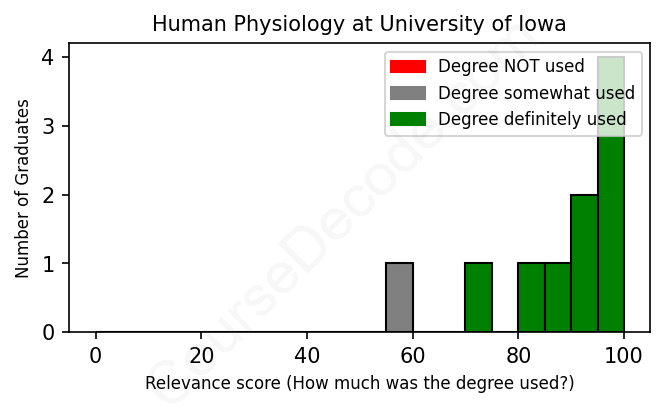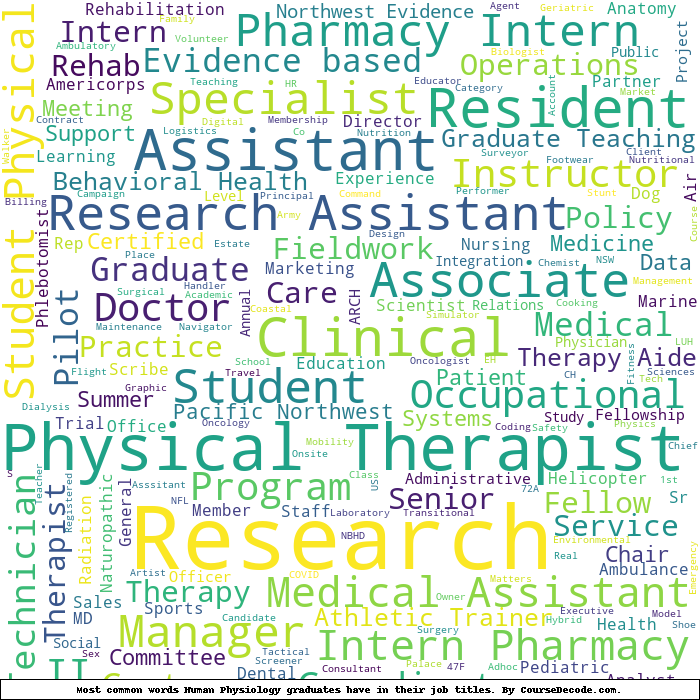
First, some facts. Of the Human Physiology graduates from University of Iowa we've analyzed , here's how many have used (or NOT used) their degree in their career:

These are estimates based on AI analysis of 10 LinkedIn profiles (see below).
The verdict? Great! Overall, with an average relevance score of 88%, Human Physiology graduates from University of Iowa have a substantially higher likelihood (+21%) of finding work in this field compared to the average graduate across all fields:
And for comparison, here's the chart for all profiles we've looked at across all degrees.
Also, after graduating, 60% of these graduates have pursued further education other than another Bachelor's degree (such as a Masters degree or other), compared to the average across all profiles of 35%. This suggests you may need more than just a Bachelors degree to be competitive as a Human Physiology graduate.
See the details:
|
Relevance score: 93% We think this person has gone into a career highly relevant to their degree. We think this person has gone into a career highly relevant to their degree.
DEGREE INFOGraduated in 2019 from University of Iowa with a Bachelor of Science - BS in Human Physiology. Also pursued further education since (see below). JOB HISTORY SINCE GRADUATIONClient Care Intern Buffini & Company Jun 2019 - Aug 2019 Dental Resident  ChristianaCare Jul 2023 - Present FURTHER DEGREES DONE SINCE GRADUATINGDoctor of Medicine in Dentistry - DMDUniversity of Pennsylvania 2019 - 2023 ABOUTNo information provided. |
The top 10 most common jobs done by the graduates we've analyzed (ranked most common to least) are:
After analyzing various LinkedIn profiles of individuals who graduated with a degree in Human Physiology from the University of Iowa, it's clear that many of them have moved into jobs that are either directly related to healthcare or involve the application of human physiological concepts in some way. A significant number have pursued careers as Pediatric Residents, Clinical Pharmacists, Physical Therapists, and Research Associates, all of which require an intricate understanding of human physiology and its principles. In these roles, the knowledge from their degree is essential for providing patient care, conducting medical research, or managing clinical trials.
On the flip side, there are also positions filled by these graduates that don't directly relate to their studies, like Environmental Safety Coordinators and Americorps Members. While these roles may use some skills that could cross over into health and safety, the connection to human physiology isn’t strong. However, overall, it seems that graduates often end up in positions that are relevant to Human Physiology, especially in medical and research settings. It’s definitely a field with a variety of career paths, but those sticking closely to healthcare and clinical roles are tapping directly into the knowledge and skills they acquired during their studies.
Here is a visual representation of the most common words in job titles for Human Physiology graduates (this is across all Human Physiology graduates we've analyzed, not just those who went to University of Iowa):

Based on the LinkedIn profiles analyzed, it looks like graduates with a degree in Human Physiology from the University of Iowa generally have a promising trajectory in health-related careers. Many of the graduates are starting off engaged in internships or introductory positions in healthcare, like working as health education volunteers, rehab techs, or pharmacy interns. These initial roles seem to serve as stepping stones, allowing them to gain valuable hands-on experience in the field. For instance, those who initially took on research internships have progressed into roles like Research Associate or Clinical Trial Research Associate, which suggests a strong alignment with their academic background.
Fast forward five to ten years, and many of these graduates are working in various health professions or research roles that definitely relate back to their degree. Some have become physical therapists or clinical pharmacists, which are directly connected to understanding human physiology and health. While there are a few who have drifted into roles like Environmental Safety Coordinator or general health education — indicating a bit of a detour from direct patient care — overall, it appears that many graduates are successfully building careers in healthcare settings or research environments. So, while there might be some deviation from the core focus of human physiology, the general trend shows that graduates are finding solid career pathways in fields that matter, making a positive impact on people's lives. Overall, it seems like a good bet for anyone considering this major!
A Bachelor’s degree in Human Physiology, especially at a school like the University of Iowa, can be pretty challenging, but it really depends on your interests and strengths. You’ll dive deep into topics like anatomy and biology, which can get pretty intense, especially with all the detailed memorization required. If you enjoy science and have a knack for staying organized and studying consistently, you'll probably find it manageable. That said, it might be a bit harder than average for some people because of the rigorous coursework and lab components. So, if you’re up for a challenge and genuinely curious about how the human body works, it could be a rewarding experience!
Most commonly, in the LinkedIn profiles we've looked at, it takes people 4 years to finish a Bachelor degree in Human Physiology.
Looking at these Human Physiology grads from the University of Iowa, it seems like they've found their way into some decent jobs, especially in health-related fields. The ones who became pediatric residents, pharmacy residents, and clinical pharmacists are likely making pretty solid salaries, given how competitive and in-demand those roles are. Others, like the Environmental Safety Coordinator or various research roles, might not start at the same higher pay scale, but they’re still on a path to good earnings, especially as they gain experience. Overall, it seems like they're generally doing alright financially, even though some might start slow before hitting their stride. So, if you're considering a path in this field, it looks promising!
Here is a visual representation of the most common words seen in the "about" section of LinkedIn profiles who have a Bachelor degree in Human Physiology (this is across all Human Physiology graduates we've analyzed, not just those who went to University of Iowa). This may or may not be useful:

Here are all colleges offering a Bachelor degree in Human Physiology (ordered by the average relevance score of their Human Physiology graduates, best to worst) where we have analyzed at least 10 of their graduates:
| College | Score | Count |
|---|---|---|
 University of Iowa University of Iowa
|
88 | 10 |
 Boston University Boston University
|
80 | 20 |
 University of Oregon University of Oregon
|
74 | 19 |